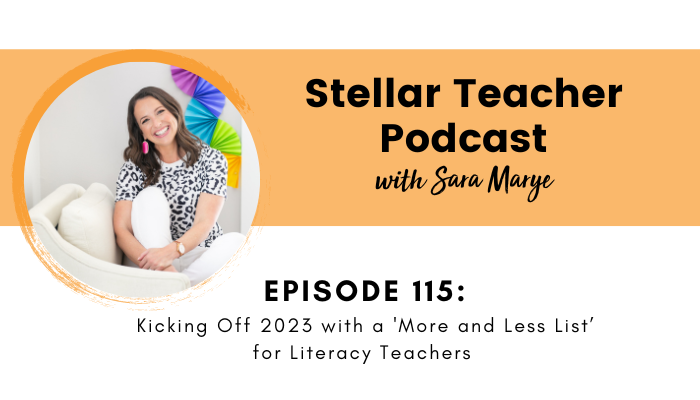
Click play below to hear my ‘more and less list’ for literacy teachers:
Happy 2023, friends! As this podcast celebrates 2 years, I like to reflect on the journey of this milestone, while also thinking about the goals and plans for the upcoming year. I have to admit that I’m not into making resolutions, for I tend to make them specific, which then ultimately, I end up not following through. Instead, I make a ‘more and less list’. So in the spirit of resolutions, in today’s episode, I’m sharing my ‘more and less list’ for literacy teachers.
The idea behind resolutions is to modify or change our behaviors, which in our case, is our classrooms and how we teach literacy. I’ve created two separate lists: one list are things you should do more as literacy teachers and the second list are things you should do less of as literacy teachers. Within the lists, I share reasonings and examples that are applicable to implement in your classroom this year.
The beginning of a new year is the perfect time to reflect on your journey and make goals for the remainder of the school year. You’re already an amazing literacy teacher, but by adding or eliminating things from my ‘more and less list’, you’ll be able to develop and grow your students’ literacy skills.
In this episode on ‘more and less list’ for literacy teachers, I share:
- A special shoutout celebrating teacher wins in our Stellar Teacher community
- How to make your lessons more simultaneous rather than separated
- Why you shouldn’t be scared to try something new
- A challenge to pick a few from the lists to implement in your classroom this year
- Preview of what’s to come next week and the rest of January
Resources:
- Word of the Day: Context Clue Routine Freebie
- Check out the Stellar Teacher Reading Membership
- If you’re enjoying this podcast, please leave a review on Apple Podcasts!
Related episodes and blog posts:
- Episode 107, 5 Ideas for Using High Impact Writing Activities in Any Content Area
- Episode 101, A Literacy Routine for Building Students’ Sentence Structure Skills
- Episode 78, Literacy Routines for an Engaging End of the Year
- Episode 74, Poem of the Week Routine Part 2: Fluency
- Episode 73, Poem of the Week Routine Part 1: Comprehension
- Episode 61, Using Picture of the Day to Promote Inferential Thinking
Connect with me:
- Join my newsletter
- Shop my TPT store here
- Instagram: @thestellarteachercompany
More About Stellar Teacher Podcast:
Welcome to the Stellar Teacher Podcast! We believe teaching literacy is a skill. It takes a lot of time, practice, and effort to be good at it. This podcast will show you how to level up your literacy instruction and make a massive impact with your students, all while having a little fun!
Your host, Sara Marye, is a literacy specialist passionate about helping elementary teachers around the world pass on their love of reading to their students. She has over a decade of experience working as a classroom teacher and school administrator. Sara has made it her mission to create high quality no-fluff resources and lesson ideas that are both meaningful and engaging for young readers.
Each week, Sara and her guests will share their knowledge, tips, and tricks so that you can feel confident in your ability to transform your students into life-long readers.
Tune in on your favorite podcast platform: Apple, Google, Amazon, Spotify, Stitcher, and more! If you’re loving this podcast, please rate, review, and follow!
Podcast (stellar-teacher-podcast): Play in new window | Download
Hey there and Happy New Year! Just Holy freaking cow. I cannot believe that it is already 2023 like, here we are.
This is an exciting time of year. Not only are we starting out the new year, but the Stellar Teacher Podcast is getting ready to celebrate its second birthday this week, which feels pretty epic to me. It’s really hard to believe that this podcast is already two years old.
And just for a little sort of like frame of reference. I am the type of person that gets really into celebrating milestones and anniversaries, and really any sort of celebration. As a side note, my husband will regularly ask me, hat are we celebrating this week? Because I do love to keep track of the important dates in our relationship.
And in the past, we have celebrated the day we met which was August 17. The day he sent me a random Facebook message that was really the kickstart of our relationship that happened to be August 2, the day we started dating, which was November 23. The day we got engaged, which was May 7. And the day we got married, obviously that’s a big one we celebrate, which was August 27, and so many other days in between.
But really anytime I hit an important milestone, celebration or anniversary, I always like to look back and reflect. And I really like to think about my journey up until that point. And as I think about starting my podcast two years ago, I do remember one of the fears that I had before starting it was whether or not I’d be able to keep up with regular weekly episodes. The idea of really having to be disciplined and record weekly episodes terrified me. And I was also really worried that I would run out of content and episode topics to talk about.
Yet here we are episode 115. And there has only been one week in the two years of this podcast where I was not able to release a new episode. And I have a massive list of ideas for future episodes. So running out of episode topics is not something that has happened yet. And honestly, sometimes I think I should start releasing two episodes a week just to share all of my content ideas with you.
But really, when I reflect back on the fears that I had before starting the podcast, it just kind of reminds me that oftentimes we spend so much time and energy, worrying about things that never actually come to fruition. And I often think I know, at least for me personally, and I know this to be true for a lot of my friends and family too, that we often don’t pursue goals or dreams, or we’re afraid to start something because we worry about fill in the blank. And whatever that fill in the blank is, it rarely actually happens.
And so before we jump into the actual content of this episode, since we are kicking off a brand new year, as you are thinking about your goals and your plans for 2023, try not to let your worries get in the way of the things that you are hoping to accomplish.
You know, I think it’s human nature for us to worry and fear the unknown of the future. But don’t let that prevent you from starting something that you really want to start or try or do whether it’s professional or personal. So get after it. 2023 is just starting and I hope that it is going to be an epic year for you.
Okay, so one of the things that I really want to do this year is shout out and celebrate the amazing things that our Steller Teacher community is doing. We get tons of feedback on the podcast and on our TPT products and on our reading membership and we get emails and Instagram messages. And we hear about how your teaching has improved or a win that your students have had. And we want to celebrate whatever it is that we can.
So our first shot of the year goes to jayfunk113, who left a review on our podcast and this listener feedback was amazing. They said, “I have been listening since October of 2021 and I needed some ways to get my gifted fifth graders more engaged. Sara gives great tips that are aligned with my literacy beliefs, and I love listening every Monday and have even scrolled through lots of past episodes to get ideas on literacy standards I was teaching. This podcast keeps me and my students motivated.”
First of all, I love that this teacher is actively pursuing and looking for ways to challenge and motivate their gifted students. And while I can provide all the ideas and suggestions on this podcast, you are the ones who are putting them into practice. So jayfunk113, thank you for being a faithful listener. And I really can’t wait to hear how your students continue to grow and literacy this year.
And speaking of growing and literacy this year, since we are just kicking off the 2023 calendar year, I thought it would be fun to do a resolution themed podcast. Now if you’re not into resolutions or goal settings, hang with me, these resolutions really aren’t what you think they are. And while I am a pretty goal oriented person, and I’m pretty competitive, and always like to have something that I’m working towards, I actually stopped doing new year’s resolutions a couple years ago, kind of for a few reasons.
And part of it was is I first of all used to set some pretty big goals for the year, I would have fitness goals, I would have savings goals, I would have sleep goals, travel goals, cooking goals, reading goals, and lots and lots of business goals. But the problem is, is when you have really specific goals, and if you miss the mark on one of those goals early on in the year, you kind of lose the motivation or momentum to keep working on them towards the goal.
So for example, one year I had the goal to cook a brand new recipe every single week, I enjoy cooking, I love cooking new recipes. And so I thought this would be a really great way for me to sort of just motivate myself and cook something new. And so I made a little calendar checklist that I would use to track my progress. I had a note set up on my phone where I had links to the recipes I wanted to try, I had even mapped out all of the recipes I was going to try in January. So I knew right away what I was cooking at the start of the year.
And I think for the first three weeks, I cooked in your recipe, but January got busy. And I think maybe I got sick or something. And by the end of the month, I had missed a week. And so already the month wasn’t even over and my goal was to cook a brand new recipe every single week of the year. And I was like well, I’ve missed one week. So I guess this goal is no longer attainable. And so I just kind of gave up on it, which is kind of my classic response to new year’s resolutions.
And I realized that the whole point of resolutions is for us to modify or change our behaviors. And we can do that successfully, even if we aren’t 100% perfect in our execution. So instead of setting very specific goals, what I really like to do is make a list of things that I would like to do more of, and things that I want to do less of.
So this really helps me focus on my actions, and the things that I want to change. But it also gives me the freedom and flexibility to adjust the pace at which I want to achieve my goals when life gets busy because we know it’s going to.
So I simply write down things like I want to spend more time cooking new recipes and less time going out to restaurants. And that allows me to focus on the action of cooking more new recipes without being very specific or you know, getting discouraged after a month because I missed a week of cooking something new.
So I thought it would be fun to share with you my more and less list for literacy teachers. So if you are wanting to set some professional goals for yourself, here are some things that you might want to do more or less of in the new year. So first of all, let’s start off with the five literacy things that I think you should do more of in 2023.
And the first one is read more nonfiction with your students. And while I am a fan girl of fiction, I love fiction stories, and I think most of the time stories and fictional texts tend to appeal to our students. And they often find their way in our classrooms more often than nonfiction. We really want to be intentional about reading more nonfiction with our students.
And we want to do this for a few reasons. First of all nonfiction is going to help our students build their content knowledge and core subjects like science and social studies. I’m sure you’ve heard the phrase that in kindergarten through second grade students are learning to read. And then in grades three through five, it shifts where students read to learn. Well, we really have to think about the knowledge and the information that we want our students to be able to learn in order for them to be successful in school in all content areas.
And we then want to really be intentional about exposing them to texts that are going to help them learn the key concepts in these topics. So again, thinking about science and social studies, specifically. But nonfiction texts also really helps students build their vocabularies and kind of for a similar reason, you know, oftentimes nonfiction texts have way more content specific vocabulary terms that students need to learn in order for them to understand the topic.
And while reading nonfiction and exposing students to more content specific vocabulary terms is a great way for you to intentionally focus on vocabulary. And Nancy Hennessy is the author of the book The Reading Comprehension Blueprint and she has just so many great ideas in there. But one of the things that she talks about is one of the things that she says in her book is informational text is an important source of students domain knowledge and vocabulary. And by the time students reach fourth grade, much of the content they encounter in the classroom is presented in the form of expository text.
And so knowing that our students are going to be exposed and really expected to learn how to comprehend nonfiction text at a much greater level in upper elementary, we want to be really intentional about giving them more opportunities to read nonfiction texts. And we want to teach with nonfiction texts more often and incorporate it into small groups and our read aloud and just any opportunity.
And so the more you can read nonfiction this year, I think the better and I think too, kind of like the third point to this, is that nonfiction has so much more variety when it comes to both text structure and text features. And if we really want our students to feel confident in reading and understanding it, then we need to give them plenty of opportunities to do so. So one thing you want to do more of this year is definitely read more nonfiction this year.
Okay, another thing that you want to do more of this year is spend more time being engaged in a single text. And I think we have a bad habit of rushing through the texts that we read, at least I did when I was in the classroom, we plan our lessons, we find materials for the whole group and small group and independent practice. And oftentimes, it can just feel like we rushed to read whatever is in front of us in the moment.
But I think it’s important for us to remember that there is so much power and learning potential when we slow down and dig into a single text. So rather than focusing on just reading, try to also make a plan for how you can incorporate more writing, more discussing, more questioning, more connecting, more analysis and attention to vocabulary and sentence structure, more understanding of the topic content. So whatever it is that you are reading, think about how you can go deep with it. And really help your students understand that text and engage with the text beyond just reading it.
Really every single text you read has multiple learning opportunities and try to take advantage of them this year. So spend more time engaged in one single text.
Okay, the third thing that you want to spend more time doing this year is spend more time embedding grammar into your reading lessons. And whether it is sentence structure, or parts of speech or any other grammar rule, you want to make sure that you’re spending time embedding grammar into your reading lessons.
And we know that syntax is a really important part of language comprehension, which is essential if we want our students to become skilled readers. But oftentimes, sentence structure and really old grammar concepts is taught from the writing perspective. And we think about really like the output our students are providing, you know, can they identify a complete sentence, can they write a complete sentence, et cetera, et cetera.
But we don’t often think about grammar, and sentence structure and parts of speech from a reading comprehension perspective. But it is really important. You know, we want students to understand that comprehension begins at the sentence level, we want the students to understand that the words and sentences play a specific role to the function and the meaning of the sentence.
And that is usually connected to their specific parts of speech. And we want to make sure that students understand how they can break apart and deconstruct complex sentences so they can understand the story within a single sentence.
And while that can happen when you’re teaching grammar during your writing lessons, or teaching it as a standalone, if you can really highlight and point out things like sentence structure and parts of speech, and deconstructing sentences so we can comprehend at the sentence level, that is going to have a huge impact on your students reading this year. So spend more time with grammar during your reading lessons.
Okay, the next thing you want to do more of this year is incorporate more thematic planning. And I’m not actually going to spend a lot of time explaining this because I have an entire podcast episode planned for the end of this month to talk all about thematic planning, also known as cross curricular instruction. So I’m not going to go too in depth on it on this episode, you will have to wait for episode number 119, because it’s coming.
But basically, thematic planning is when you identify a topic or a concept that you want students to understand and then you plan your literacy lessons around that concept.
So for example, let’s say you were learning all about ecosystems and science, and you’re learning about food webs and food chains and the different animals that live within ecosystems and how ecosystems change as a result of human impact. And you’ve got all these specific objectives that you want your students to learn about ecosystems.
So rather than just teaching that concept during your science lessons, you are going to search for reading passages and books and articles that are all about these specific objectives and learning targets and sort of these core concepts about ecosystems that you want your students to learn.
You’re going to identify vocabulary words, you know, that are important to this topic. And you’re going to figure out which ones have roots and word parts and affixes, and which ones are embedded in sentences where they can use concept clues.
And you’re gonna identify vocabulary lessons that you can teach around these words that are related to ecosystems, you’re going to plan your writing assignment so students are either you know, writing summaries, or they’re writing, you know, paragraphs that are related to ecosystems, or maybe an essay at the end after they’ve done all of this research, but your writing is going to be connected to this topic as well.
So basically, rather than teaching everything individually, you’re picking one sort of key theme, and you’re embedding all of your literacy lessons into that specific theme. And like I said, I’ve got a whole podcast episode on this for the end of the month. So stay tuned, you’ll learn more about it then. But it’s definitely something that you want to do more of this year.
And then the last thing that you want to consider doing more of in 2023, is to use more high impact literacy routines. And honestly, if you’ve been a longtime listener of the podcast, this one should not surprise you. Because you guys know that I love a high impact literacy routine. And this is just a phrase that I use to describe any routine that is repetitive, it is quick, it is easy, but yet it has a really big impact on your students literacy growth.
And some examples of high impact literacy routines include things like word of the day, poem of the week, my sentence writing routine, or even picture of the day for making inferences. And if you currently do not have any high impact literacy routines in your classroom, now in January is a great time to start. And you can actually get a free sample of My Word of the Week routine at stellarteacher.com/contextclues. And we will link to that in the show notes.
And if you also want to learn more about this idea, if this idea of using a high impact literacy routine is appealing to you, and you want to hear more, go back and listen to episode number 76, where I talked about how you can engage students with literacy routines.
Okay, so those are five things that you might want to consider doing more of in 2023. Let me quickly just share five things that I think you might want to spend less time doing in 2023.
The first thing is less time teaching literacy concepts as isolated silos. And if you listen to my list of things we should do more of this kind of goes along with it. And what I mean by silos is when we when we talk about our literacy block, oftentimes we think of having a reading lesson and having a separate writing lesson and having an a separate spelling lesson, and a separate vocabulary lesson and a separate grammar lesson. And everything is taught separately. And even if we’re not teaching a new lesson, the practice activities that students are doing are all very separate.
And one of the things that teachers often talk about is how they don’t have enough time to get through everything in a single day. And I get it because there’s a lot that teachers have to teach. But one of the ways that you can maximize your time is by teaching and practicing literacy concepts simultaneously, or kind of like some of the things I mentioned, using thematic planning or embedding grammar into your reading lessons, just being really intentional about how you can get multiple literacy teaching moments out of a single learning experience.
You know, so rather than having a separate grammar practice sheet, use your reading text and use that text to identify the parts of speech or the specific types of sentences. You know, rather than having an isolated writing lesson, you know, teach your writing objectives or teach your students to go through the writing process through a writing about reading task.
And rather than teaching vocabulary, you know, is an isolated lesson or you know, set of words pull up key content words and break them apart into word parts and roots. So that way students understand the meaning of those words and some of those key vocabulary words but it’s not separated. So basically, just look for ways you can teach multiple literacy standards using shared resources.
Okay, the next thing you want to spend less time doing this year is spend less time searching for the perfect materials. And I know teachers have the best of intentions when they are searching for materials and they want it to be perfect. They’re looking for the perfect passage for small group lessons. They’re looking for the perfect workstations. They’re looking for the perfect text for their read aloud.
You need materials for everything you teach, you need texts, you need resources, you need, you know, materials for students to practice independently. But the thing that you need to remember or remind yourself of is that there is no such thing as a perfect set of lesson materials or resources.
So rather than spending hours trying to find something that is perfect, just make the first thing that you find work for you or figure out how you can repurpose something because the magic is not in the materials that you use. The magic is in how you teach them and engage your students and using that materials. So eliminate this idea of trying to find something perfect just spend less time searching for perfect materials, use what you have.
Okay, the other thing I want you to spend less time doing this year is spend less time teaching to the test. And I know that it’s still a couple of months away yet, but I have a pretty good hunch, because I remember being a classroom teacher. And I also remember being an assistant principal. And for whatever reason, when we get back to school in January, it’s like test prep is almost like the only thing that admin and teachers tend to focus on.
And so it’s possible to your your admin is already having you look at test prep data, that you’re doing practice tests, that you’re having to identify students that need more intervention, and the test is going to become the big focus. But the reality of it is, is you still have half a calendar year left, and that is a long time to teach students and to effectively teach your standards and literacy concepts that are going to be important to their growth, without having to focus just on the standardized test.
So I’m not telling you to completely ignore the test, I definitely am a firm believer in making sure our students feel as prepared and as confident as they can be when it comes to standardized testing. But that is very different from making everything you do from January until test stay centered around the test. So I would challenge you now because now is the time to make the plan of the decision, I would challenge you to limit your formal test prep season to just three weeks.
And really until the three weeks before your state test, try not to stress out about it and try not to stress your kids about it. And here’s the thing, and I learned this from like I said, being a classroom teacher and an administrator and many, many years of trying to prioritize test taking skills. More time taking practice tests does not result in better test results. And but more time engaged in high quality literacy instruction and activities is going to result in literacy growth, which will ultimately result in better test results.
And here’s the thing that I really want you to remember is you are an awesome literacy teacher, you know how to teach reading and you know how to teach writing and don’t let all the talk about state testing, scare you into spending more time on multiple choice tests, and just talking and hyper focusing on the standardized tests. Do what you need to do to meet your school’s sort of expectations and test prep.
But also do whatever you can to preserve the quality and structure of your literacy block for as long as possible without making everything you do focused on the test, especially the closer we get to it.
Okay, something else that I want you to spend less time doing this year is spend less time second guessing yourself. You know, I think we waste so much mental energy questioning the decisions that we make. And teachers have to make a lot of decisions, you know, and if anything, give yourself the gift of confidence this year.
If you’re listening to this podcast, then it’s really obvious that you take time outside of school to learn and research and figure out how to be a more effective teacher. And if anything, trust the reasons why you decide to do something, you know, whether it is the small group objectives you’ve selected, how to set up and structure your literacy block, the books that you are selecting, trust that you are making the right decisions.
I can guarantee you that not every decision you make is going to be 100% perfect, because we are human and no one can make perfect decisions all of the time. But we can stop second guessing ourselves. And we can be confident in the decisions that we make. And we can also learn to engage in thoughtful reflections that are going to help us to become more confident in the future. So let’s just not second guess ourselves this year.
And then the last thing that I want you to spend less time doing is spend less time avoiding things that scare you or are new to you. And I feel like this kind of comes back full circle to what I was talking about with my podcast at the beginning of this episode.
We are often scared to try new things, because they might fail or they might not work out, you know how we think they will. But also the opposite is true. You know, something new that you might try might work out better than you expected. If there is something new that you want to try in your classroom, but it’s scary, or you’re not quite sure how it’s going to work out, do it anyways. You know, don’t spend any more time wondering how to make it work, just go for it.
So whether that is starting small groups for the first time, or wanting to bring in more opportunities for your students to collaborate or introducing movement routines, or doing flexible seating or doing more thematic planning, whatever it is, spend less time worrying about it and just go for it.
Okay, so now I’ve basically shared 10 things with you to think about this year. And let me just really quickly review them because it’s been a minute. So the first things that I want you to do more of, first of all, read more nonfiction, spend more time engaged in a single text, spend more time embedding grammar into your reading lessons, incorporate more thematic planning and spend more time on high impact literacy routines.
And the five things that you can do less of this year is you can do less teaching literacy concepts as isolated silos, you can spend less time searching for the perfect materials, you can spend less time teaching to the test, spend less time second guessing yourself, and spend less time avoiding things that scare you or are new.
Now 10 things is a lot of focus on at once. So don’t feel like you need to tackle all 10 this year or even right away. But if there are two to three things that I listed that either resonate with you, and you can see how they would benefit your students to do more or less of that specific literacy thing, then I would encourage you to add it to your teacher list this year. And just like I said, this is a goal that is meant to help you change your behaviors or actions for the long term.
So don’t get discouraged if you don’t do, you can’t stick with it for the single week. There’s no timeframe attached to it. So just simply try to do more or less of the things that you do add to your list. But know that I am super excited to be kicking off year three of the Stellar Teacher Podcast with you and I hope you’ll tune in next week just to give you a little bit of a sneak peek.
During the month of January, we’re going to be talking a lot about nonfiction and next week we’re going to be digging into one of my favorite nonfiction topics, which is text structure. So until then, have a stellar week and have a very Happy New Year.

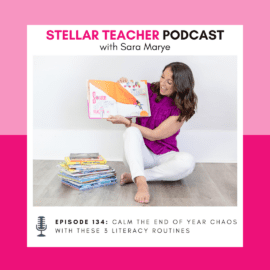
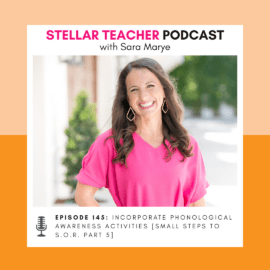
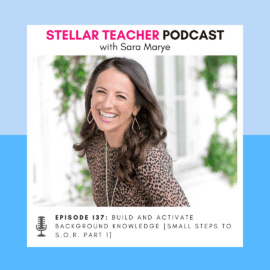
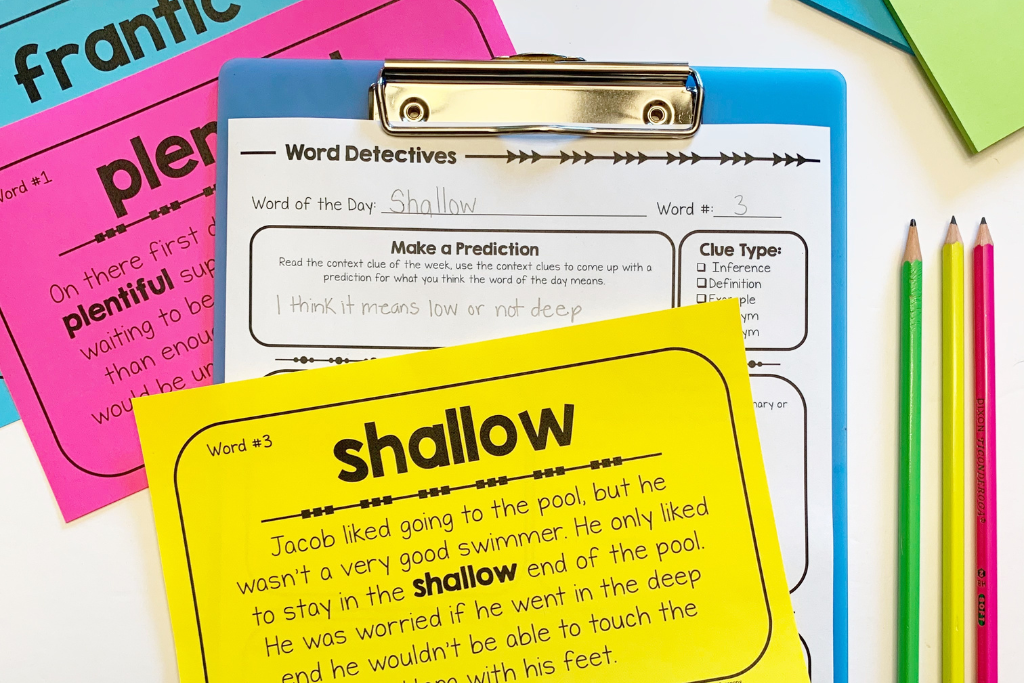
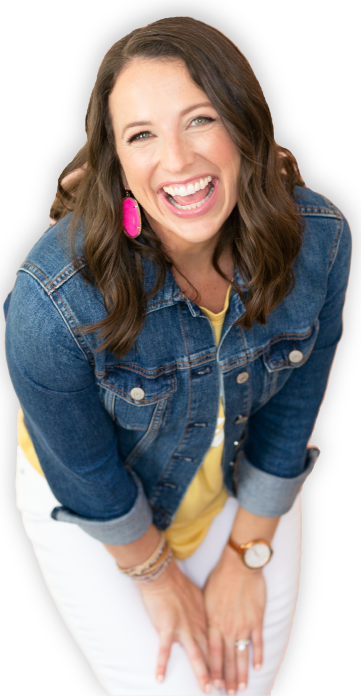
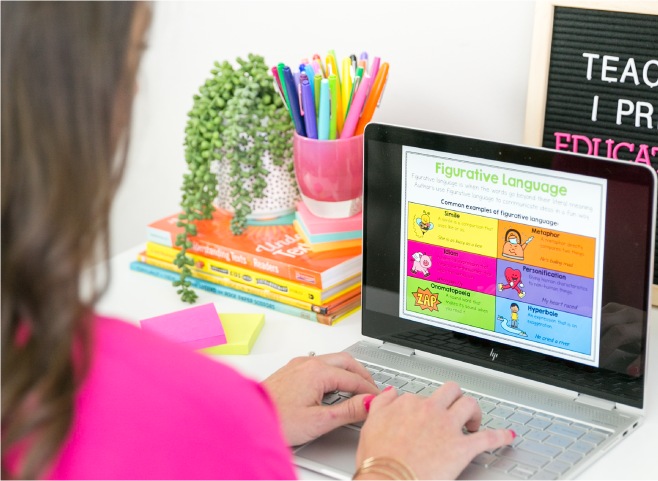
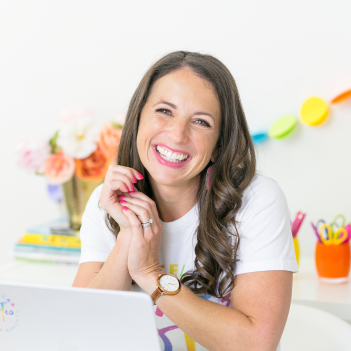
Leave a Comment
You must be logged in to post a comment.